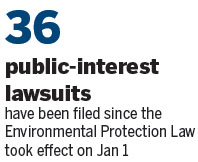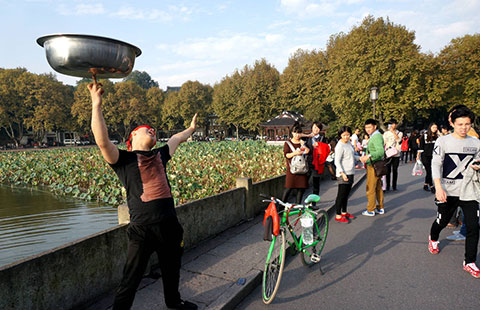Mending environment is a 'priority' in green lawsuits
By Cao Yin in Gutian, Fujian (China Daily) Updated: 2015-11-09 08:42Chinese courts must take ecological restoration as a priority when hearing environmental disputes and must ease the path for public-interest litigation in order to reduce ecological damage, said Jiang Bixin, vice-president of the Supreme People's Court.
Increasingly serious protests in response to environmental damage and the surge of environmental disputes in recent years have led to new requirements in environmental case hearings, "which is why it is urgent for Chinese courts to learn to remediate the environment through trials," Jiang said during a two-day seminar in Fujian province for courts that regularly hear environmental cases.
By the end of last year, Chinese courts heard more than 230,000 environmental cases, and 27,552 of those were criminal disputes, according to the court.
As the environmental case load increases, justice in China has hardened its stance against those who seriously damage the environment.
One week before the seminar, green organizations won a lawsuit against four men for environmental damage in Nanping, Fujian province, in the first public-interest litigation since the revised Environmental Protection Law took effect on Jan1.

The four defendants had damaged 1.89 hectares of woodland. Nanping Intermediate People's Court ordered them to pay 1.27 million yuan ($200,000) toward ecological restoration within 10 days.
Jiang applauded the public-interest litigation victory and said the case could serve as an example to other courts in Fujian and urged courts to ease the path for public-interest litigation.
"Ecological remediation is the priority in dealing with environmental cases - the protection and restoration of the environment is the goal of our verdicts," Jiang said. "We should give defendants a deadline to restore the environment and explore a system to verify that the judgments have been carried out."
Since the revised law took effect, 36 public-interest lawsuits have had been filed in more than 13 provinces and municipalities, including Hainan and Beijing, and two such cases have concluded, Jiang said.
He asked all courts to make it easier to file such cases and to work on completing more typical cases to improve the quality of environmental trials.
During the seminar, 15 courts were selected as models for dealing with environmental cases - among them was Zhangzhou Intermediate People's Court in Fujian, where judges hear more than 300 environmental cases a year.
The Zhangzhou court has accumulated significant experience in hearing environmental cases, said court Vice-President Chen Zhifu, as Zhangzhou is a coastal city that has much woodland.
caoyin@chinadaily.com.cn
- Only 10% apply for second baby
- Debate lingers over impact of meeting
- Autism incidence higher than expected
- Xi: Taiwan Straits' relations at a crossroad
- Leaders across Taiwan Straits meet for first time in 66 years
- Cross-Straits meeting
- Xi, Ma to meet at 3 pm in Singapore
- Taiwan leader vows to bolster cross-Straits peace, cooperation
- Dinner meeting serves up solutions
- Higher deficit ratio 'worth discussing'







